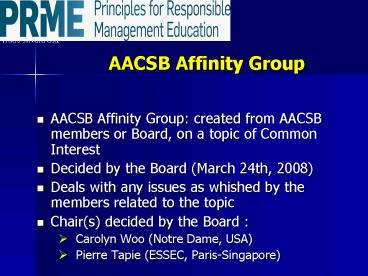AACSB Affinity Group - PowerPoint PPT Presentation
1 / 11
Title:
AACSB Affinity Group
Description:
... future leaders to become globally responsible citizens, as part of our ... the Globally Responsible Leadership Initiative (GRLI), Net Impact and the ... – PowerPoint PPT presentation
Number of Views:66
Avg rating:3.0/5.0
Title: AACSB Affinity Group
1
AACSB Affinity Group
- AACSB Affinity Group created from AACSB members
or Board, on a topic of Common Interest - Decided by the Board (March 24th, 2008)
- Deals with any issues as whished by the members
related to the topic - Chair(s) decided by the Board
- Carolyn Woo (Notre Dame, USA)
- Pierre Tapie (ESSEC, Paris-Singapore)
2
AACSB Affinity GroupsObjectives
- Address own environments to encourage future
leaders to become globally responsible citizens,
as part of our institutional mission, and develop
the appropriate framework of reference as
intellectual corpus to sustain this development - Promote PRME among AACSB members
- Share ideas and best practices among members of
the affinity group - Network among institutions worldwide who have
adopted the PRME - Contribute to the information exchange between
PRME schools within AACSB and UN Global Compact,
the PRME Secretariat.
3
PRME Statement
- As institutions of higher learning involved in
the education of current and future managers we
are voluntarily committed to engaging in a
continuous process of improvement of the
following Principles and their application,
reporting on progress to all our stakeholders and
exchanging effective practices with other
academic institutions
4
- Principle 1
- Purpose we will develop the capabilities of
students to be future generators of sustainable
value for business and society at large and to
work for an inclusive ans sustainable global
economy. - Principle 2
- Values we will incorporate into our academic
activities and curricula the values of global
social responsibility as portrayed in
international initiatives such as the United
Nations Global Compact. - Principle 3
- Method we will create educational frameworks,
materials, processes and environments that enable
effective learning experiences for responsible
leadership. - Principle 4
- Research We will engage in conceptual and
empirical research that advances our
understanding about the role, dynamics, and
impact of corporations in the creation of
sustainable social, environmental and economic
value.
5
- Principle 5
- Partnership We will interact with managers of
business corporations to extend our knowledge of
their challenges in meeting social and
environmental responsibilities and to explore
jointly effective approaches to meeting these
challenges. - Principle 6
- Dialogue We will facilitate and support dialogue
and debate among educators, business, government,
consumers, media, civil society organizations and
other interested groups and stakeholders on
critical issues related to global social
responsibility and sustainability. - We understand that our own organizational
practices - should serve as example of the values and
attitudes - we convey to our students.
6
Scope spirit
- Principles for inspiration Benchmark
- Autoevaluation and self declaration
- Vast scope and inclusivess
- Reports on Progress
- Best practices
7
On behalf of the United National Global Compact
Office and AACSB Board of Directors, we are
writing to invite you and your academic
institution to consider becoming a signatory of
the Principles for Responsible Management
Education (PRME). The PRME is an effective
framework for leading business schools to advance
the broader cause of corporate social
responsibility. The principles constitute a truly
global call for the incorporation of universal
values into curricula and research and can guide
a school's efforts to continuously improve in
these critical areas. AACSB International
participated in the development of each of the
six principles of the PRME, and attended the UN
Global Compact Leaders Summit in July 2007 to
formally present the PRME to the UN
Secretary-General. At the summit, UN
Secretary-General Ban Ki-moon said in his closing
remarks, "the Principles for Responsible
Management Education have the capacity to take
the case for universal values and business into
classrooms on every continent."
8
AACSB International is a member of the PRME
Steering Committee, along with the European
Foundation for Management Development (EFMD), the
Aspen Institute's Business and Society Program,
the European Academy for Business in Society
(EABIS), the Graduate Management Admission
Council (GMAC), the Globally Responsible
Leadership Initiative (GRLI), Net Impact and the
United Nations Global Compact, which hosts the
PRME Secretariat. We believe that the change
agents of the PRME initiative will ultimately be
individual business schools, engaged in a
continuous change process toward achieving the
goals set out by the PRME. In its first year of
development, the initiative seeks to give
adopting academic institutions a leading role to
define a set of good practices on implementation
and reporting of the PRME.
9
UN GC Working Groups
- "How to Get Started" - this Working Group will
be Chaired by the EFMD - "Curriculum Change" - Chaired by AACSB and
co-chaired by EABIS and Aspen Institute BSP. - "Research and PRME" - Chaired by the Global
Compact Office (GCO) and co-chaired by the Aspen
Institute BSP - "New learning Methodologies and PRME", Chaired by
the GCO - "Reporting to Stakeholders" - Chaired by GRLI
10
AACSBAffinity GroupApril 14th, 2008
- List of PRIME AACSB Schools
- Forthcoming Events
- Academy of Mngt (August), UNGC PRME (Dec 1st
2nd), AACSB Sustainability Conference in Utah
(July 30th 31st) - Successful practices of PRME implementation
- Website/list for sharing of ideas
- Participation to the UN PRME working groups
- Challenges, questions, suggestions for AACSB
Affinity Group agenda ?
11
PRME at Hawaïi































